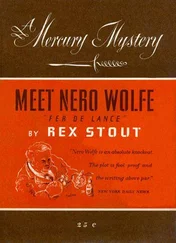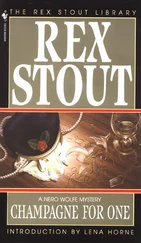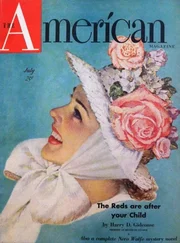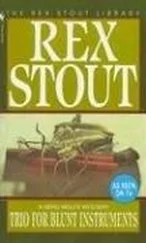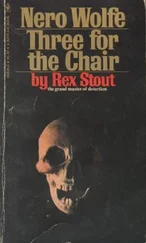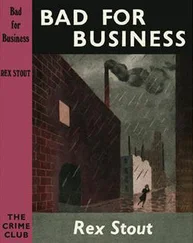Rex Stout - Fer-De-Lance
Здесь есть возможность читать онлайн «Rex Stout - Fer-De-Lance» — ознакомительный отрывок электронной книги совершенно бесплатно, а после прочтения отрывка купить полную версию. В некоторых случаях можно слушать аудио, скачать через торрент в формате fb2 и присутствует краткое содержание. Жанр: Старинная литература, en-GB. Описание произведения, (предисловие) а так же отзывы посетителей доступны на портале библиотеки ЛибКат.
- Название:Fer-De-Lance
- Автор:
- Жанр:
- Год:неизвестен
- ISBN:нет данных
- Рейтинг книги:5 / 5. Голосов: 1
-
Избранное:Добавить в избранное
- Отзывы:
-
Ваша оценка:
- 100
- 1
- 2
- 3
- 4
- 5
Fer-De-Lance: краткое содержание, описание и аннотация
Предлагаем к чтению аннотацию, описание, краткое содержание или предисловие (зависит от того, что написал сам автор книги «Fer-De-Lance»). Если вы не нашли необходимую информацию о книге — напишите в комментариях, мы постараемся отыскать её.
Fer-De-Lance — читать онлайн ознакомительный отрывок
Ниже представлен текст книги, разбитый по страницам. Система сохранения места последней прочитанной страницы, позволяет с удобством читать онлайн бесплатно книгу «Fer-De-Lance», без необходимости каждый раз заново искать на чём Вы остановились. Поставьте закладку, и сможете в любой момент перейти на страницу, на которой закончили чтение.
Интервал:
Закладка:
I felt better after that. Maybe luck was headed our way after all.
I got the two caddies at the club without any trouble, but it took over an hour to round up the other two. They went to different schools, and while one of them didn't need any persuading to go for a ride to New York, the other one must have been trying to qualify for teacher's pet or a Rhodes scholarship. At first I kidded him, and when that didn't work I switched to the ends of justice and the duties of a good citizen. That got him, and the woman in charge of the school, too. I suspected I wouldn't care an awful lot for his companionship, so I put him and another one in the rumble seat, and with the other two in with me I found the trail back to the Parkway and turned south. I kept the speedometer down to forty thenceforth, for I knew I couldn't expect Anderson to do me nothing but favors.
We arrived at a quarter to eleven, and I took the boys to the kitchen and fed them sandwiches, for the lunch hour was one. I wanted to take them up and show them the orchids, thinking it wouldn't hurt them any to get impressed, but there wasn't time. I got their names and addresses down. One of them, the pale skinny kid who had caddied for Manuel Kimball, had a dirty face and I took him to the bathroom for a wash. By the time Wolfe appeared I was beginning to feel like a boy scout leader.
I had them arranged on chairs in a row for him. He came in with a bunch of Cymbidiums in his hand which he put into a vase on his desk, then he got into his chair and flipped the mail. He had told the boys good morning as he entered; now he turned and settled himself comfortably and looked them over one by one. They were embarrassed and shifted around.
"Excuse me, Archie. Bad staging." He turned to the boy at the end, one with red hair and blue eyes. "Your name, sir?"
"William A. Riley."
"Thank you. If you will move your chair over there, near the wall-much better… And your name?" When he had got all their names and scattered them around he said, "Which one of you expressed doubt that Peter Oliver Barstow was killed by a needle shot from the handle of a golf driver? Come, I'm only trying to get acquainted; which one?"
Chunky Mike spoke up. "That was me."
"Ah. Michael Allen. Michael, you are young. You have learned to accept the commonplace, you must yet learn not to exclude the bizarre. – Now, boys, I'm going to tell you a story. Please listen, because I want you to understand it. This happens to be a true story. There was a meeting in a public hall of a hundred psychologists. A psychologist is-by courtesy-a man trained to observe. It had been arranged, without their knowledge, that a man should run into the hall and down the aisle, followed by another man waving a pistol. A third man ran in by another door. The second man shot at the first man. The third man knocked the second man down and took the pistol from him. They all ran out by different doors. One of the psychologists then arose and stilled the clamor, and announced that the events had been prearranged, and asked each of his colleagues to write down immediately a complete detailed report of the whole affair. They did so, and the reports were examined and compared. Not one was entirely correct. No two agreed throughout. One even had the third man shooting at the first man."
Wolfe stopped and looked around at them. "That's all. I'm not a good story-teller, but you may have caught the point. Do you see what I'm getting at?"
They nodded.
"You do. Then I shall not insult your intelligence with an exposition. Let us go on to our own story. We shall sit here and discuss the death of Peter Oliver Barstow, more particularly the events on the first tee which led up to it. At one o'clock we shall have lunch, then we shall return here and resume. We shall discuss all afternoon, many hours. You will get tired, but not hungry. If you get sleepy you may take a nap. I state the program thus in full so that you may know how elaborate and difficult an undertaking confronts us. Mr. Goodwin has heard two of your stereotypes; I fancy the other two are practically identical. A stereotype is something fixed, something that harbors no intention of changing. I don't expect you boys to change your stories of what happened on that first tee; what I ask is that you forget all your arguments and discussions, all your recitals to families and friends, all the pictures that words have printed on your brains, and return to the scene itself. That is vitally important. I would have left my house and journeyed to the scene myself to be with you there, but for the fact that interruptions would have ruined our efforts. By our imaginations we must transfer the scene here. Here we are, boys, at the first tee.
"Here we are. It is Sunday afternoon. Larry Barstow has engaged two of you; two of you are with the Kimballs, carrying their bags. You are on familiar ground, as familiar to you as the rooms of your own homes. You are occupied with activities so accustomed as to have become almost automatic. The straps of the bags are on your shoulders. You, Michael Allen, when you see Mr. Barstow, your last season's baby, at a distance from the tee practicing with a mashie, you do not need to be told what to do; you join him, pick up his bag, hand him a club perhaps?"
Mike was shaking his head.
"No? What do you do?"
"I begin chasing balls."
"Ah. The balls he was hitting with the mashie."
"Yes, sir."
"Good. What were you doing, William Riley, while Michael was chasing balls?"
"I was chewing gum."
"Exclusively? I mean, was that the utmost of your efforts?"
"Well, I was standing holding old Kimball's bag."
Listening to him start, I was thinking that Wolfe's long words would get the kids so tied up that pretty soon they would just go dead on him, but it worked the other way. Without telling them so he had given them the feeling that he was counting on them to help him show how dumb the hundred psychologists had been, and they weren't going to get licked at it because it took long words to do it.
He went along inch by inch, now with this boy, now with that, sometimes with all of them talking at once. He let them get into a long discussion of the relative merits of various brands of clubs, and sat with his eyes half closed pretending he enjoyed it. He questioned them for half an hour regarding the identities and characteristics of the other caddies and golfers present, those belonging to the matches which immediately preceded the Barstow foursome at the tee. Every time one of the boys bolted ahead to the actual teeing off Wolfe called him back. Among all the irrelevancies I could see one thing, perhaps the main thing, he was doing: he wasn't losing sight for a single instant of each and every club in each and every bag.
For lunch Fritz gave us two enormous chicken pies and four watermelons. I did the serving, as usual when there was company, and by speeding up with my knife and fork I barely managed to get my own meal in by the time the casseroles were empty. The watermelons were simple; I gave a half to each of the boys and the same for Wolfe and myself, and that left one for Fritz. I suspected he wouldn't touch it but thought there might be use for it later on.
After lunch we resumed where we had left off. It was wonderful the way Wolfe had long since opened those boys' minds up and let the air in. They went right ahead. They had forgotten entirely that someone was trying to get something out of them or that they were supposed to be using their memories; they were just like a bunch of kids talking over the ball game they had played the day before, only Wolfe was on top of them every minute not letting them skip a thing and all the time making them go back, and back again. Even so they were making progress. Larry Barstow had made his drive, and Manuel Kimball had made his.
Читать дальшеИнтервал:
Закладка:
Похожие книги на «Fer-De-Lance»
Представляем Вашему вниманию похожие книги на «Fer-De-Lance» списком для выбора. Мы отобрали схожую по названию и смыслу литературу в надежде предоставить читателям больше вариантов отыскать новые, интересные, ещё непрочитанные произведения.
Обсуждение, отзывы о книге «Fer-De-Lance» и просто собственные мнения читателей. Оставьте ваши комментарии, напишите, что Вы думаете о произведении, его смысле или главных героях. Укажите что конкретно понравилось, а что нет, и почему Вы так считаете.

